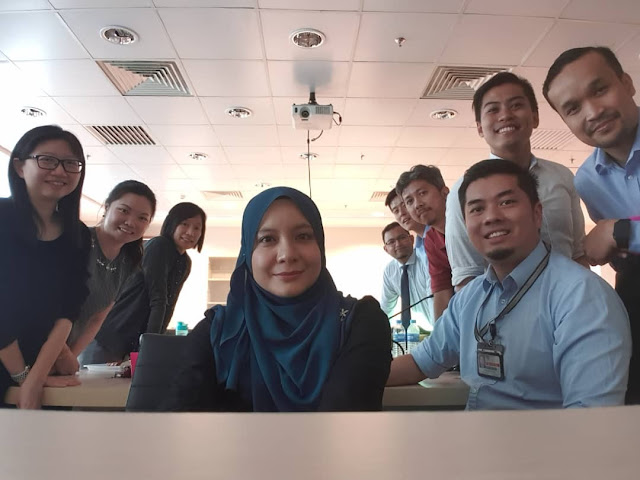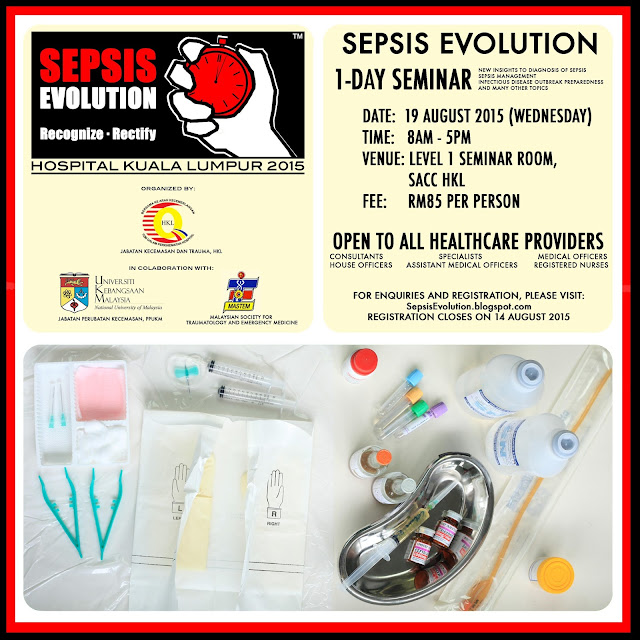3rd May 2019
2nd Malaysian Sepsis Evolution (MySE) Seminar
We are proudly present to you our 2nd Malaysian Sepsis Evolution (MySE, pronouce as mise) Seminer.
The registration already open. Please come and join us.
Click here for registration.
****************************
18th Jan 2019
Sepsis Management Update- Advanced Level
Organised by: Malaysia Sepsis Alliance
Speaker: Dr Tan Toh Leong
Senior Lecturer and Emergency Department
AMS UKMMC Committee
SIGMARIS MALAYSIA
Malaysia Sepsis Alliance in conjunction with Emergency Department of Universiti Kebangsaan Malaysia Medical Centre had organized a Sepsis Management Update Course on 18th January 2019. It involved specialist around Malaysia which included expert from emergency department, microbiology department, biochemistry department and etc. In this course, the understanding of sepsis was enlightened by all of expert from various field. Sepsis Identification and Management was greatly emphasized in this course where quick identification of Sepsis or Septic Shock in suspected patients, determination state of sepsis either SIRS, CARS or MARS, obtained suggested biomarkers and management of sepsis by initiate 1 hour bundle while maintaining the volume and cardiac contractility.
14th Dec 2018
Intermediate Sepsis Workshop and Advance Hemodynamic Monitoring in ED (sponsor by Edward Lifescience)
Speaker: Dr Tan Toh Leong
Senior Lecturer and Emergency Department
AMS UKMMC Committee
SIGMARIS MALAYSIA
On 14th December 2018, The Emergency Department of Universiti Kebangsaan Malaysia Medical Centre held an Intermediate Sepsis Workshop for all emergency physicians and post graduate doctors. It's a great pleasure to have this workshop sponsored by Edward Lifescience. The
definition of sepsis and its clinical stages characterisation have been changing for the past decades until most recently in 2018. It remains high motality rate and healthcare provider find it challenging to understand and manage sepsis. Thus, this workshop was held to augment the understanding and management on sepsis with an ultimate aim to identify and treat sepsis as early as possible based on the latest Survival Sepsis Campaign Guideline. In conjunction to the workshop, Edward Lifescience took this opportunity to introduce non-invasive ClearSight system which extends the benefits of continuous hemodynamic monitoring includes measuring stroke volume, stroke volume variation, cardiac output, systemic vascular resistance and continuous blood pressure.
11th Oct 2018
Sepsis Interprofessional Workshop at Nottingham University, United Kingdom, China and Malaysia Oct 2018
Once a year, we will conduct a sepsis workshop for the pharmacy students from Nottingham University UK, China and Malaysia. The workshop aim to share our clinical experiances in managing sepsis with the future pharmacist-to-be. The workshop aim to expose the Pharmacist-to-be to recognize the important of sepsis and how to approach Sepsis in the interprofessional manner. Our team comprise of aan Emergency Physician Dr Tan Toh Leong, a senior asistant Medical Officer, Mr Muhammad Kamarul and a senior Nurse Mdm Premalatha who are all very enthusiastic in sepsis care. The workshop was successful delivered and the students love it so much.
The syllabus and contents are originated from SEPSIS TRUST, United Kingdom, which Sepsis Six was introduced.
THE SEPSIS MANUAL Edited by Dr Ron Daniels and Dr Tim Nutbeam, provides detailed education free of charge for every healthcare professional in the UK. It includes UKST’s ‘Sepsis Six’ pathway (which halves the risk of patients dying). You may download the pdf file at the link provided.
With the alignment with aim of Global Sepsis Allince and Asia Pacific Sepsis Alliance, we are at our best to increase sepsis awareness in our country (Malaysia).
11 August 2018
Antimicrobial Stewardship Committee Universiti Kebangsaan Medical Centre Continue Medical Education 10 Aug 2018
Our Antimicrobial Stewardship Committee Universiti Kebangsaan Medical Centre are hosting a CME on 10 Aug 2018. The CME are highlighting the appropriateness of antibiotic usage and understanding Rabies and Post Exposure Prophylaxis
Topic of interest
10 August 2018
8.30am
A STUDY ON THE APPROPRIATENESS OF EARLY EMPIRICAL ANTIBIOTIC THERAPY ASSOCIATION WITH 28-DAY MORTALITY AMONG PATIENTS WITH SEPSIS SYNDROME PRESENTED TO EMERGENCY DEPARTMENT UKMMC
Speaker: Dr Tan Toh Leong
Senior Lecturer and Emergency Department
AMS UKMMC Committee
SIGMARIS MALAYSIA
9.00am
UNDERSTANDING RABIES AND POSTEXPOSURE PROPHYLAXIS
Speaker: Dr Vickneswaran Muthu
Ketua Penolong Pengarah Kanan
Sektor Zoonosis, Bahagian Kawalan Penyakit, Kementerian Kesihatan Malaysia
**************************************************
16 July 2018
EMERGENCY MEDICINE ANNUAL SCIENTIFIC MEETING 2018
Art & Science in Emergency Medicine – Putting Evidence into Practice
Incorporating 1st WINFOCUS ASIA CRITICAL ULTRASOUND SYMPOSIUMS
Organizer: College of Emergency Physicians,Academy of Medicine, Malaysia
Time : 6th - 8th August 2018
College of Emergency Physician, Academy of Medicine Malasysia going to hold this greatest annual Scientific Meeting for our Emergency fratenity to come togather, aim to put up all the latest updates in Emegency Medicine and translate Art to Science. We would to congratulate the organizing chairman Dr Mahathar Abd. Wahab, current president of College of Emergency Physicians,
Academy of Medicine, Malaysia, for putting such a big activity to gather us togather.
Here is the link for more information
The programs are as below:
*******************************************************************

Dear Friends,
SIGMARIS would want to inform you that on September 5th and 6th, 2018, the Global Sepsis Alliance will host the 2nd World Sepsis Congress – which is a great opportunity for you to connect and learn with leading sepsis experts from around the globe – right from your home or office.
We are endorsing this innovative online-only congress and hereby encourage you to participate, which is completely free of charge and can be done from wherever you have an internet connection.
To register now or to find out more on program, speakers, time zones, and much more please go to www.worldsepsiscongress.org.
In 17 distinctive sessions, over 100 speakers from 30 countries will give 10-minute keynotes and presentations on the number one preventable cause of death worldwide: sepsis. From prevention to acute management, long-term sequela, and epidemiology of sepsis, all topics regarding sepsis will be covered. There will also be a panel discussion with sepsis survivors and their families. After each talk, the speakers will answer live questions from the audience.
After the congress, all presentations will be made available to view on demand on the World Sepsis Congress YouTube Channel and as a Podcast on Apple Podcasts.
____________________________________________________________________________________________________________
Come join us in this powerful 1-day seminar focusing on new insights to diagnosing sepsis, sepsis management and infectious disease outbreak preparedness. Organized by the Emergency Department of Hospital Kuala Lumpur, in collaboration with the Department of Emergency Medicine, Hospital Canselor Tuanku Muhriz, Pusat Perubatan UKM and Malaysian Society for Traumatology and Emergency Medicine (MASTEM), this seminar is opened to all healthcare professionals from Malaysia and all over the world.
Date:
19th August 2015
(Wednesday)
Time:
8am - 5pm
Venue:
Bilik Seminar Aras 1,
Kompleks Pakar Rawatan Harian
Hospital Kuala Lumpur
Fees:
RM 85/pax
ONLINE learning :
https://www.openlearning.com/courses/sepsis-and-infectious-diseases
Lecture Synopsis
Lecture
1 (0800-0830) : HKL Sepsis Census by Dr Faisal Salikin
In 2012, sepsis was recorded as the third
highest principle cause of death in Malaysia with 16.37% as compared to 13% in
2008. Prevalence of sepsis is estimated to be around 38% based on daily census
in Malaysia from year 2006 till 2014. In
this lecture, the HKL sepsis census will be presented along with the KPI the HKL
Emergency Department hopes to achieve in controlling the disease.
Lecture
2 (0830-0915) : Identifying Sepsis: The Silent “Pandemic” by Dr Tan Toh Leong
Sepsis remains a leading cause of death in
critical care practices to this day, despite advances in resuscitation therapy
and also use of modern antibiotics. This lecture highlights the reasons why
sepsis is a “silent pandemic” due to difficulties in identification of the
condition.
Keynote 1 (0915-1000) : Opening Keynote by Prof Dato' Sri Dr Hj. Abu Hassan Asaari Abdullah
Sepsis is the 10th leading cause of death in most industrialized countries; its incidence is increasing yearly at a rate of approximately 5-10%. Difficulties in its identification cause its increasing prevalence, and, besides causing morbidity and mortality, sepsis also leads to complications in antimicrobial stewardship. A timely revolution is needed in the treatment and management of sepsis, especially in this era of international and borderless travel which encourages the spread of infectious diseases outbreaks.
Lecture
3 (1030-1115) : Sepsis: The Diagnostic Evolution by Dr Tan Toh Leong
Diagnosis of sepsis in a patient who has
been suspected of having infections remains difficult to this day, especially
in patients where clinical signs and symptoms are vague or are difficult to
interpret. Culture and sensitivity (microbiological cultures) lack in
sensitivity as it frequently yields negative results due to previous or
concomitant antibiotic therapy, or there was error in collecting its sample.
Advances in sepsis diagnostics will be presented in this talk to aid clinicians
in making the best decisions for their patients.
Lecture
4 (1115-1200) : Sepsis Management: The Challenge Begins by Dr Ida Zarina Zaini
Sepsis is the only treatable disease that
recovers fully if the appropriate interventions are started early. The question
is: How early? And with what interventions? How do we determine if the
intervention given was appropriate?
Lecture
5 (1200-1245) : Sepsis in Special Groups: The Pitfalls by Dr Hidayah Shafie
How do we provide the best and most
suitable care for sepsis patients in special groups, such as pregnant mothers,
oncology patients and those with immune deficiencies? And what are the
pitfalls? This lecture provides some answers.
Lecture
6 (1245-1330) : Antibiotic Stewardship in HKL by Dr Leong Chee Loon
The Emergency Department is managing a lot
of acute emergency as primary care. It is very challenging to give an appropriate
diagnosis at emergency especially if patient are critically ill. Thus,
judicious use of antibiotics is going to be very challenging.
The lecture will be on the importance of
things to be done at A&E to support the antibiotic stewardship program such
as the importance of taking all the culture before starting antibiotics.
Delayed in starting antibiotics will affect outcome of patient, but proper
assess of the source of infection and judicious use of antibiotic is also
important at emergency department, as resistant organism is a global issue and
this will lead to "no action today, no cure tomorrow".
Due to increase in awareness among patient about their right under civil law, the health care providers who treat a patient with sepsis having a potential to be sue in court. This lecture will introduce the medico legal challenge and litigation risk facing by health care provider while treat a sepsis patient.
Lecture 7 (1415-1500) : Legal Burden on Sepsis by Dr Nizam Ishak
Lecture 8 (1500-1545) : Infectious Disease Outbreak Preparedness by Dr Ridzuan Dato’
Mohd Isa
In managing sepsis of recent times, it is
also critical that healthcare professionals are familiar in dealing with an
infectious disease outbreak. Outbreaks
are an ongoing threat to the health and livelihoods of people everywhere. Over
the last few decades, there have been several outbreaks related to sepsis which
have taken the global community by surprise and drawn new attention to diseases
like HIV, and Ebola. On the local front, diseases and outbreaks like dengue
remain an on-going challenge. Governments, multilateral institutions, and other
organizations have increasingly recognized the threat such diseases pose and
have augmented efforts to prepare for and address them.






























